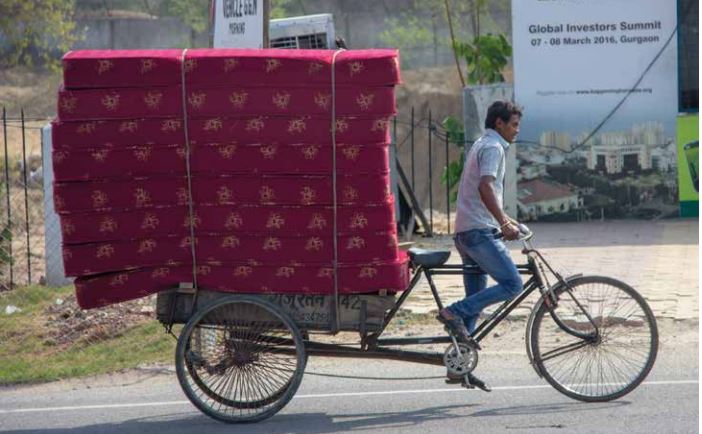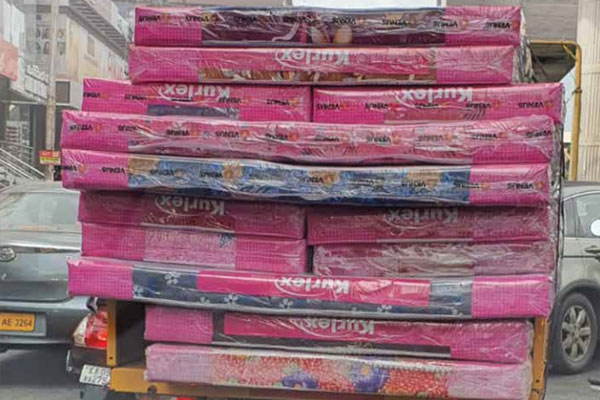Mattress companies in India are improving their logistics set-up to ensure efficiency in their business operations. Though better use of logistics has changed the way the mattress industry operates in India, the fact is that logistics costs in India are too high and are a huge cost to mattress companies.
Logistics is the backbone of any business. An efficient logistics sector of a country can contribute towards the growth of its economy. According to a recent EY report, titled ‘India@100: realizing the potential of a US$26t economy’, India is projected to grow to US$26t by FY48. India’s transportation and logistics sector can act as the backbone to support this fast-paced growth, which the country is poised to achieve in the next 25 years.
If we just look around, everything that we order over the phone and is delivered to our doorstep in a few minutes to a few days is all backed by efficient and robust logistics. Even in the Indian mattress industry, logistics plays a crucial role. For an industry that is working aggressively towards increasing its share in the overall market pie, having a strong logistical set-up is quintessential. With e-commerce and the D2C model being a trend in shaping the Indian mattress industry, it is important to analyze the role of logistics in the Indian mattress industry. The logistics in the Indian mattress industry are significantly improving as the industry witnesses growth due to factors like increasing demand for mattresses, expanding e-commerce platforms and raising awareness about the importance of quality sleep.
Importance of Logistics in mattress business
Mattress makers in India are trying various ways to ensure customer satisfaction. Meeting consumers’ explicit and implicit needs is the need for any business across various business domains; the mattress industry is no exception. The logistics in the Indian mattress industry are progressing to meet the growing demands and expectations of customers. From improved warehousing and transportation to efficient last-mile delivery options, the industry focuses on providing customers with a seamless experience in the mattress-buying process.
Mattress manufacturers and retailers are investing in spacious and well-equipped warehouses with temperature control systems to store their products. Companies are using efficient transport modes like trucks, vans, and even specialized vehicles equipped to handle large-sized mattresses to ensure safe and timely delivery to customers. The last-mile delivery, which involves transferring mattresses from distribution centres to customers’ homes, is becoming more streamlined. Companies are partnering with courier and delivery services to provide efficient and quick deliveries. Additionally, companies are also adopting technology like GPS tracking systems to track deliveries in real time.
The rise of e-commerce platforms and Direct to consumer (D2C) model has revolutionized the logistics in the mattress industry. Customers can now purchase mattresses online and have them delivered safely to their doorsteps. E-commerce platforms are collaborating with logistical partners to ensure smooth delivery experiences for customers. Companies are investing in sturdy and protective packaging materials to safeguard the mattresses from any damage during transit. “Most of the brands, have opened up stores and warehouses everywhere, so instead of sending it from factory, they keep stocks ready at very vulnerable points. This has made mattress delivery easier and there has been a great improvement in mattress logistics now,” explains S Sundaresan, Secretary, Indian Sleep Products Federation (ISPF). He also explained that these days mattresses are delivered within 24 hours, whereas, earlier, delivery of mattresses would take upto a week.
India’s transportation and logistics sector can act as the backbone to support this fast-paced growth, which the country is poised to achieve in the next 25 years.
The D2C model has gained a lot of popularity and it has been observed that it is one of the most preferred models for startups. The D2C model allows startups to eliminate the middlemen involved in the distribution of mattresses, allowing the mattress makers to have complete control over the entire customer experience. Through this model, mattress companies can cut out the costs involved in engaging the middlemen, rather, they invest the available financial resources towards ensuring efficient logistical practices.
Many D2C mattress brands offer trial periods and hassle-free return policies to customers. This allows customers to try out the mattress in their own homes and return it within a specific time frame if they are not satisfied. As D2C mattress companies deal directly with customers, their logistical arrangement should be more efficient than traditional mattress companies. There are higher chances of reverse logistics in D2C businesses as customers may call the company back for a return or exchange of mattresses. As Sundaresan of ISPF mentions, reverse logistics has also become easier these days. This gives good scope for D2C businesses to thrive in the highly competitive mattress market.
Meanwhile, experienced players in the mattress market are also offering online deliveries of their sleep products either through their exclusive online stores or various online marketplaces. In addition to that, they too, have consumer-friendly return policies, meaning their logistics set-up should be strong enough to cater to these requirements.
The ‘Bed in a Box’ concept is gaining popularity due to the logistical convenience these models offer. For instance, in tier-1 cities, wherein, most people reside in high-storied buildings, ‘bed-in-a-box’ works out to be a convenient buy due to easy logistical processes. The box can easily reach any floor through a lift and can be assembled at home. It saves costs incurred on manpower and the time that goes into supervising the correct handling of the product.

Logistics has been an important part of mattress business and with the industry shaping up with new ideas and business models, it’s going to get more important for mattress companies to make their logistical setup more streamlined and efficient. Through the deployment of right technology, mattress companies can witness a positive impact on their logistical management. “Technology has made logistics easier, in terms of letting retailers know about the stock availability in other warehouses in close proximity. So instead of getting a new mattress manufactured from a factory, retailers can get the stock from the nearby warehouse and deliver it to the customer on time,” ” explains Sundaresan.
Role of technology in managing logistics
Technology impacts logistics management by enhancing inventory management, optimizing warehouse operations, streamlining transportation, facilitating demand forecasting, improving customer service and providing valuable data insights. By leveraging technology, companies can ensure better operational efficiency, reduce costs and deliver better customer experience. Technology has made logistics in the mattress industry easier, in terms of the following:
• Stock or Inventory Management
• Efficient and faster Warehouse Operations
• Transportation Management
• Demand Forecasting and Planning:
• Customer Service and Communication
• Data Analysis and Visibility
However, this is the ideal way in which technology can facilitate better logistics management. The role of technology in daily logistics management in mattress industry still has a lot of scope for improvement.“The role that technology should play in managing logistics is not being played well. The ERP, application systems in many of these companies, is sub-optimally implemented, wherein, the logistics part of it is by and large managed manually, in terms of, procurement, shipping in the warehouse. In other words, the technology has to play a pivotal role in managing logistics and supply chain which is not done, as of today. I would say, it is a huge opportunity in improving the role of technology in logistics and supply chain management. And there is a distance to go by these industries, especially in terms of, precision and adequacy of forecasting, arrivals of materials into the factory, integrated with your suppliers in one platform and working seamlessly and shipment of goods, either B2B or B2C to your customers, providing them a fair level of visibility and transparency and predictability of when they are going to receive the goods,”explains Sreedher Kadambi, Managing Director of SKIL Global Business Solutions.
Conclusion
Logistics plays a very important role in ensuring the smooth functioning of mattress deliveries. Mattress companies prioritize customer satisfaction and hence, maintaining smooth logistical function is quintessential for the mattress companies operating in India.
According to a report released by Aviral Consulting in 2022, “Government initiatives to develop infrastructure and implementing new tax regime GST have changed the express logistics business. Express Logistics companies in India are moving from traditional setups towards integration of IT and technology and this is expected to reduce the costs incurred and meet service demands. The government’s initiative “Make in India” is expected to boost the manufacturing sector to 10 percent growth.”
The numbers may look promising but the fact remains that logistical costs are quite high in India making it difficult for companies to stay profitable. The Aviral Consulting report mentions that the USA spends 9.5 per cent of the GDP on logistics while Germany is even more competitive with a share of eight per cent. Higher logistical costs in India could be ascribed to the lack of efficient inter-modal and multimodal traditional systems, thereby, presenting significant future scope for development and efficiency. Himanshu Mehta, Managing Director at Himrag Coir Products Private Limited explains, “During the pandemic, delivery companies had imposed substantial price rises on all deliveries. There is no remarkable advantage as far as logistics is concerned because of the increase in fuel prices and the prices imposed by logistics companies in India.”
The rising costs of logistics is one of the primary concerns for mattress companies. With higher prices imposed by logistics companies, it will be difficult for mattress companies to stay profitable.
To ensure customer satisfaction, mattress companies are offering trial and easy return policies. Cases of reverse logistics could also add up to the logistical costs to the company. While established players have their network of distribution centres to optimize logistical costs, for new players it is still a challenge to stay profitable due to the rising cost of logistics. Though the benefits of logistics with the intersection of technology are tremendous, it is still exorbitant for an industry, wherein, the organized players are yet to grab a dominating market share. However, the positive part is logistics in the Indian mattress industry is getting more streamlined and with better deployment of technology, it is likely to get more streamlined and cost-effective.


